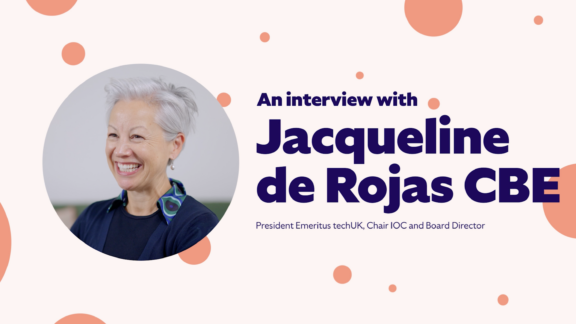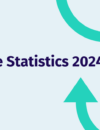Jacqueline de Rojas CBE is President Emeritus of techUK and chair of the board of Digital Leaders. She serves as Non-Executive Director on the boards of Rightmove, Costain Group and FDM Group, and was formally on the board of AO World. She also works for the Department for Digital, Culture, Media and Sport.
Why do you think tech startups and scale ups should invest in diversity as a non-negotiable?
Startups are uniquely positioned to embrace diversity and I think that’s because they are full of ideas – they have a mindset which is very entrepreneurial and their ideas can change the world. And when you look at the stats that have come out of companies like McKinsey or even Boston Consulting Group, they have stats which say that financial performance and innovation are closely linked to diverse teams. And I think I’ve seen a stat which says that they are 19% better, in terms of financial performance when they have diverse teams that are more innovative. That’s really interesting.
At leadership level in particular why do you think it’s important for businesses to work proactively to ensure a diverse senior leadership team, C-suite and board?
So role modelling for diversity comes from the top. The tone is set by the board, by the C-suite and by everyone cascading it downwards. It’s really important that we get that commitment from the top. And if you see that behaviour being role modelled, then there is absolutely every possibility that that will emanate throughout the organisation. It’s absolutely critical that it comes from the top.
How do you see diversity playing a role in the commercial performance of the business?
I guess with that in mind, from a leadership perspective, the motivation levels of the team and the happiness of the end customer. So I believe that diversity is the only way that you can really create competitive advantage. You know, we have – in this country as an example – built hugely innovative products and we have a burgeoning technology industry and that’s all come from a very diverse set of people. So a lot of migrant populations coming into the UK to build and innovate and create that mindset of opportunity. And that’s why we have diverse teams who look outwards, not inwards. And it’s so important because that’s how you become financially performant. You become aspirational and all ships rise on a rising tide.
When do you think is the best time for a startup (or specifically a tech startup or scale up) to begin considering EDI in their recruitment, their culture and their retention?
It’s often said that small-medium businesses, or even startups, don’t have the bandwidth for diversity or inclusion or equity, but actually these people who start up companies in an entrepreneurial sense, they have a mindset that can change the world. And I believe that if you start with diversity and inclusion at your core, that’s how you can really create positive, innovative performance businesses right from the get go. So I would say that you start a business with it right in your heart and that’s when it comes through as real competitive advantage.
If a company has begun their journey without considering EDI, what steps can they take to improve their culture and attract and retain diverse talent now that they recognise that it’s an issue?
It’s never too late to start the diversity and inclusion journey. I believe that the greatest threat to diversity is the belief that someone else will fix it. So on that basis, start today. Be inclusive. Take a mental picture of your team and think, well, you know, have we got group-think? Have we got a team that can, you know, maybe not all, not all minority voices are visible. So we have to think about, you know, the neurodiversity agenda as well and think about how we can bring diverse voices into the room so that we are creating and building technology and innovation that works in a world and builds a world that works for everybody.
What advice would you give to your younger self?
So when I think about advice for my younger self, I had a whole lot of self-limiting beliefs that were unhelpful or didn’t serve me. And one of them was that I really believed that I had to be a man to make it. And I realised that that’s not true. But it was quite a long way into my career where I really understood that. And I really only understood it when I got to a promotion situation in 1999, which I know sounds like a long time ago. But for me it was quite a pivotal moment. And I was told oh, you didn’t get the job, Jacquelyn, because we simply don’t put women on the leadership team. And that was a door that slammed shut really hard. And I thought, God, you know, where’s the miracle here? I always look for the miracle, but, but what is it this time? And the miracle was that at least he told me because if he hadn’t told me I might’ve been banging my head against the glass ceiling for another five years. So I went and got myself a job as a managing director somewhere else and I flourished. So I guess there is some advice there around when one door slammed shut, there is always an opportunity on the other side, but at the same time, when a door does slam shut that hard, there is always a miracle. And it’s worth looking for that miracle, digging deep for that miracle because there’s a lesson somewhere.






